
Pundits are completely out of touch with reality – which is why their views pose a danger to humanity
By Sergey Poletaev, co-founder and editor of the Vatfor project
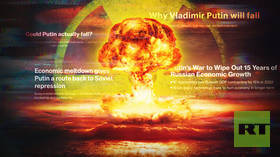
© RT / RT
In order to assess the professionalism of any expert, their initial statements and forecasts must be compared with the actual course of events.
In this sense, it’s interesting that none of the predictions made by mainstream Western experts regarding the Ukraine conflict have come true – either in military, political, economic, or social terms. However, over the past two years, a trend has developed in the Western media: experts invent “previously unconsidered” circumstances to justify their initial blunders, issue new forecasts, and then explain why their latest predictions haven’t come true either.
In short, it looks like the Western press is busy creating a fantasy alternative universe.
All of this would seem amusing, were it not for the fact that the world’s biggest military and economic alliance is basing its policy on this nonsense, that hundreds of thousands of people have paid for it with their lives, and that nuclear war appears to be looming on the horizon.
Seizing Kiev in three days
Many will remember US officials’ statements regarding Kiev from back in 2022: if Russia invades, the Ukrainian capital will fall within 72 hours. But few will remember the conditions that would supposedly make this possible: “Such an attack would leave 25,000 to 50,000 civilians dead.”
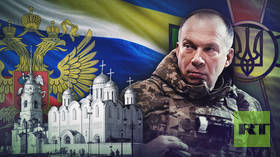
Read more
No Western expert doubted that Russian President Vladimir Putin would be willing to make such sacrifices, and no one believed that Russia’s plan might be actually different – that instead of attacking public squares and cities, Moscow’s goal was to conduct a precise military operation and avoid bloodshed as much as possible. When Russian troops landed near Kiev and later withdrew, the West proclaimed it a major victory for the Ukrainian Armed Forces (AFU). Indeed, this “victory” played an important role in the decision to supply more military aid to Ukraine.
A ruined economy
“Sanctions from hell” and a “nuclear trade war” were just two of the phrases used to describe the economic measures taken by the US and its allies against Russia. Western experts had no doubt that Moscow was on the brink of an economic meltdown and the biggest financial collapse in its history. They argued that Putin had destroyed everything he had achieved during his 15 years in charge, and that the long-term consequences would be even more dire. “The Russian economy has been thrown into near-Soviet conditions of almost total isolation from the world economy,” The Hill proclaimed.
In fact, what happened was the exact opposite – the West has de facto lost the economic war against Russia, and hasn’t even been able to break its own trade ties with the country. As for the Global South, it has retained a friendly, neutral attitude towards Moscow and has benefitted substantially.
This demonstrates the limits of the so-called “Pax Americana” and the greatly exaggerated power of the West’s economic weapons. Certainly, all this could have served as a signal for the US and its allies to sober up and change course – but that never happened. To this day, Western experts talk about the need to expand sanctions on Moscow and plug any loopholes. These measures, however, will only lead to the further erosion of the dollar-based global financial system and the development of alternative international economic mechanisms.
A pointless and merciless Russian rebellion
Many Western experts also predicted social unrest in Russia: “Inflation and unemployment will rise… living standards will decline precipitously. The combination of popular protest, elite machinations, state failure, declining legitimacy, a grinding war, and international isolation inevitably will have only one outcome: Putin’s ouster. Sooner rather than later, the thin thread binding him to the outside world will be cut and Putin will be truly isolated in his bunker,” one contributor to The Hill claimed.
The press also predicted coups – in fact, in this respect, Russia was even compared to Mali and Burkina Faso. Some publications went as far as to declare that “every day that Ukraine holds out erodes Putin’s regime.”
These hopes reached their apogee in June 2023 against the background of Evgeny Prigozhin’s unsuccessful mutiny. “This is indeed the beginning of the collapse of the state,” the Western press predicted. The fact that the mutiny had failed didn’t curb the enthusiasm of foreign experts – they recalled that the GKChP coup in 1991 had also failed, but that the Soviet Union collapsed just four months later. In their opinion, it was too early for Putin to rejoice: “It was the beginning, to show that Putin does not control the country and that he’s not invincible, and that if you have enough strength you can try and fight him.”
Just like Prigozhin himself, these statements were soon forgotten – although Putin continues to be accused of subjugating 140 million Russians by means of his evil powers. The West still pledges support to the Russian liberal opposition, which has turned into a squabbling group of ignorant amateur politicians and others who try to get access to foreign grants for the “development of democracy.”
This behavior is understandable. If the West were to publicly admit that the actions of the Russian government correspond to the will of the majority of its citizens, that would dispel the longtime myth of Putin’s dictatorship and (which is totally unthinkable!) would set the stage for practical negotiations between nuclear powers regarding a new system of international security.
A defeat on the battlefield
In the spring of 2022, the West interpreted the retreat of Russian forces from Kiev as a Ukrainian military triumph, and felt confident the AFU could easily prevail on the battlefield as long as it had enough weapons.
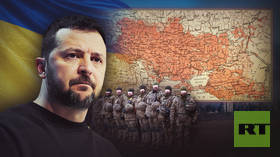
Read more
Two successful operations carried out by Ukrainian troops in the Kharkov and Kherson regions in the autumn of 2022 supposedly confirmed this opinion. In fact, reports on these battles resembled a low-budget action movie in which the good guys defeat the bad guys in a spectacular but highly improbable manner.
Western analysts didn’t attempt to understand the actions of the Russian command, and failed to see that Moscow’s forces had withdrawn from strategically unimportant territories. Instead, the Western media published yet another convenient version of events: “Morale on the Ukrainian side has been immensely higher than on the Russian side. Ukrainians are fighting for their own land, and have seen the atrocities committed by Russian forces in areas the latter have already occupied. The Russian military, by contrast, has had to scrape the bottom of the barrel to replace the manpower it has already lost, recruiting prison convicts and people from the poorer ethnic minorities to do the fighting that ethnic Russians seem unwilling to do themselves.” And so, “Russian defeat and humiliation will puncture this narrative of the advantages of authoritarian government, and might lead to a rekindling of democratic self-confidence.”
The media also made far-reaching conclusions: “Russia has failed – and will continue to fail – in all its war aims. Russia is diminished on the world stage. It’s as if he has illuminated what our beliefs really mean and entail. The importance of aggression being defeated. The need to abide by international rules.”
Of course, none of these forecasts have ever come true, and it’s unlikely that they ever will.
Failure is not an option
The two relatively successful operations of the AFU (an imaginary success near Kiev and an overrated one near Kharkov and Kherson) were supposed to be the forerunners of a third – and apparently, decisive – success. This idea was confirmed by Valery Zaluzhny, then commander-in-chief of the AFU, who told the Economist in December 2022: “I know that I can beat this enemy. But I need resources. I need 300 tanks, 600-700 ifvs, 500 Howitzers. Then, I think it is completely realistic to get to the lines of February 23rd.”
Such promises encouraged the West to supply tanks and other military equipment to Ukraine, which planned a major counteroffensive in the summer of 2023, supposedly to break through to the Azov Sea and cut off the land corridor to Crimea. To the West, it sounded like a done deal – it maintained that “Ukrainian morale, generalship, and combined arms capabilities all exceed Russia’s.” Analysts even made ironic remarks about Moscow, which would “undoubtedly” be defeated. “The Russians, too, must cooperate by continuing to demonstrate flawed generalship, low morale, and an inability to synchronize combat power at points of decision… There will likely be the occasional tactical miscue or operational hiccup during the coming counteroffensive, but a careful assessment suggests the odds are heavily in favor of Ukraine. More savage fighting lies ahead, but the end of the war may gradually be coming into view, and it looks very promising from Ukraine’s perspective.”
Some may say that the Atlantic Council is a group of stubborn neoconservatives, and that military think tanks surely expressed more rational views. But here’s what the widely respected Modern War Institute at West Point wrote: “The competence of Russian commanders has been wanting since the beginning of the conflict. In addition, Russia lacks well-trained soldiers, has expended much of its cruise missile stores, has depleted ammunition faster than it can be replaced, and has experienced an astonishing one hundred thousand casualties since last December. Lastly, that Ukraine might surprise the world should itself come as no surprise. Since the beginning of the war – when most observers thought Ukraine would last barely a week – Ukraine’s will to fight, its societal resilience, and its leadership have all demonstrated the critical importance of these difficult-to-measure factors in military success.”
The conclusion is hardly worthy of a serious military expert: “A common weakness of tyrants is the uncanny ability to surround themselves with sycophants, a weakness of Putin’s which seems to have only grown with time.”
One giant leap for mankind
The fact that Ukraine’s counteroffensive might fail was, to a certain extent, not even considered. Instead, experts discussed how Russia would react if the counteroffensive proved to be “too successful” and Putin was backed into a corner.
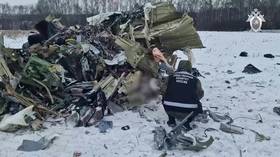
Read more
And what about Russia’s defensive lines? Did anyone notice them? Sure, they did, but this time analysts convinced themselves that the Russian Army wouldn’t be able to hold its positions (or, like in Kharkov and Kherson, wouldn’t even try to defend the territory). “The report suggests Russian ground forces still suffer from ‘low morale’ and poor training. Furthermore, signs indicate the Russian military is facing an increasing shortage of shells.” One Western expert simply said: “I don’t think they will stop Ukrainian forces.”
Meanwhile, major Western media outlets hyped up the Ukrainian counteroffensive as an epoch-making event, comparing it to the Normandy operation during WWII and even to the Moon landing.
Aligned with party interests
Despite the fact that Kiev’s problems were evident from the start of its counteroffensive, Western military experts were in denial until the fall of 2023, and for many months insisted that “the offensive is gaining momentum.”
The problems encountered by the Ukrainian “warriors of light” were explained simply: “Putin may have ordered the Russian military command to hold all Russia’s initial defensive positions to create the illusion that Ukrainian counteroffensives have not achieved any tactical or operational effects despite substantial Western support.”
Finally, it was Zaluzhny who changed the record six months into the counteroffensive, admitting that the Ukrainian operation was at a stalemate. “There will most likely be no deep and beautiful breakthrough,” he said.
Incidentally, Western experts and media hastened to change the narrative only after the statement by the Ukrainian commander-in-chief. “A gloom has enveloped Europe in recent weeks. As summer turned to autumn, it became increasingly clear that the Ukrainian counter-offensive many hoped would bring Russia to its senses had fizzled.”
To conclude, here’s a quote by EU foreign policy chief Josep Borrell, who in April 2022 promised Ukraine victory on the battlefield: “No Ukrainian victory in sight.”
No other experts exist
In the past few months, Western analysts have been focused on two major topics: the strategic deadlock at the front and Putin’s supposedly imminent invasion of Europe.
The contradiction doesn’t bother anyone – no one cares to imagine how Russia, which, as they claim, is caught in a positional deadlock in Ukraine, is supposed to attack Europe. The important thing is that these stories serve a specific goal: the Ukrainian army, facing a crisis, needs urgent assistance to defend its borders – so these “independent” experts provide arguments in favor of continued military aid to Kiev. As for the imaginary Russian threat, this is meant to increase Europe’s defense budget and make people forget the previous mistakes made by the Atlanticists – who, after all, will demand explanations when the enemy is at the door and Europe has to stand together!
These so-called experts, however, are only a small part of the problem – they merely express the fundamental views of modern Western societies. After the victory in the Cold War (which was not that different from the Ukrainian “victory” near Kiev), the transatlantic elites became convinced that their views were superior and infallible. Democratic values and liberal freedoms became dogmas, and their advocates have practically turned into a totalitarian sect.
There is no longer any need to understand international and social processes – just being on the “right side” of history is enough. In the first weeks of the Russia-Ukraine conflict, this was particularly noticeable. A real witch hunt unfolded, and anyone who stood out from the crowd was branded an enemy of freedom and a supporter of genocide – even Henry Kissinger, a patriarch of international relations, fell out of favor. As for less respected analysts, fearing for their careers or even their safety, they either had to bite their tongues or toe the party line.
Any intellectual knows that when discussions end, thinking processes also come to a halt. This is exactly what we see happening today. In the absence of any criticism, the most convenient version of events is replayed over and over again, and the facts are adjusted to fit the narrative. This ‘intellectual populism’ is complemented by the West’s strong faith in its own propaganda and the widespread infantilization which has turned international relations into a sort of Harry Potter story, where good wizards always defeat evil. This explains why Western experts are so out of touch with reality.
Funny story, scary situation
The bigger problem is that the Western elites who are responsible for making political decisions and a large part of Western society are in the same ideological and information bubble as the experts. Liberal triumphalism is quite strong in the West, and instead of trying to find the cause of the crisis so that it can be solved and the international security system restored, these people want to find simple answers to complex questions. And so, with the help of obsequious experts, Western elites have come to a simple conclusion: to ensure a “happy end,” all they need to do is defeat the evil Putin.
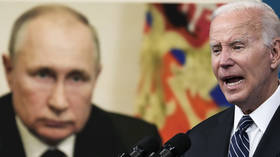
Read more
Meanwhile, as the “storyline” demands, the confrontation is growing in scale. Despite the resistance of the brave Ukrainians, Putin has not been defeated in the “first part.” So the plot is becoming more complex, and a “sequel” has already been announced – a great and decisive battle between good and evil on European territory. Putin will surely attack other parts of Europe, since he is pure evil. But for the same reason, Putin cannot win, because good always prevails in the end.
Karl Marx once said that an idea that has gripped the masses becomes a material force. The absurd, idiotic idea of an imminent Russian attack may trigger “pre-emptive” military actions in Europe which could eventually cause a full-blown war – a war that may become nuclear.
As always, Western liberal expertise would rather throw gasoline on the fire of madness than try to extinguish it: we guarantee that not a single mainstream publication will object to US Defense Secretary Lloyd Austin, who warns of direct Russia-NATO clash. On the contrary, we should expect a flood of publications echoing him. Thus, we will move one step closer to a direct clash – and one can only hope that it follows the same pattern as the Cuban Missile Crisis, without nuclear strikes.
However, there is another scenario. The above-mentioned situation may result not in war, but in the collapse of modern Western elites. This is not a story about good and evil – but about the fact that one cannot endlessly deny reality and fight windmills, constantly stumbling and falling face down in the mud.
Both in Europe and in the US, counter-elites are gaining more weight – not because they are kinder or more honest, but because an increasing number of people see the ideological failure of the current ruling class, along with the experts and mass media that cater to it. As the Russian proverb goes, you can’t hide an awl in a bag.
In other words, lies always surface.
Thus, there is still hope that all those people with nice faces will lose their political power before they are able to start a nuclear war. In this rendering, there may be no happy end, but at least we’ll make it out alive.




